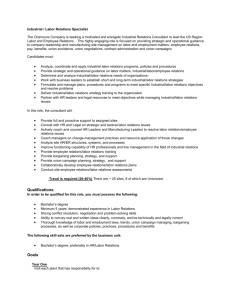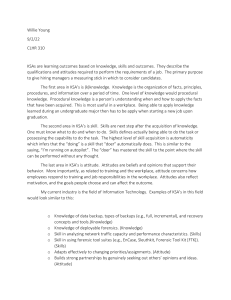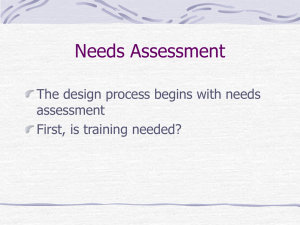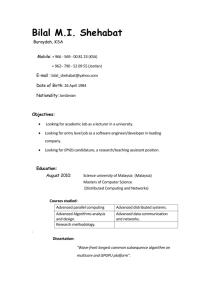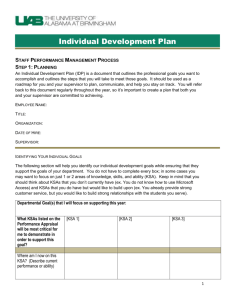Identifying Training Needs
advertisement
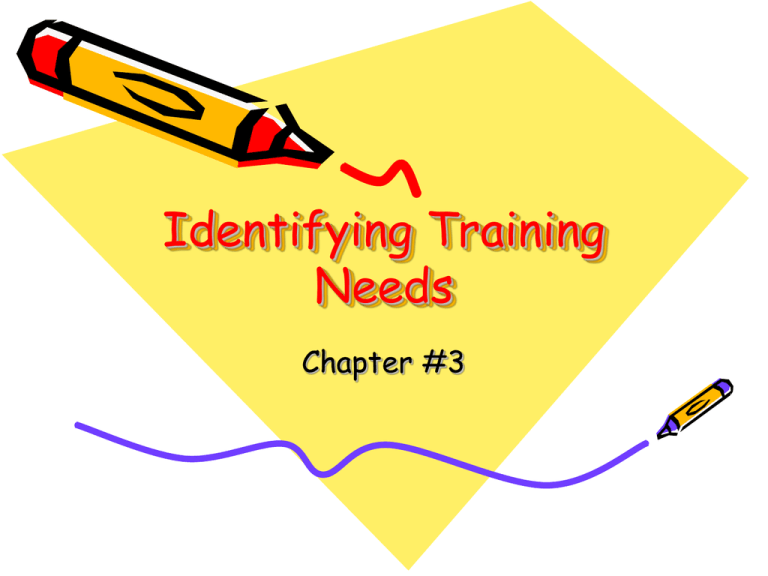
Identifying Training Needs Chapter #3 Why is demand for t and d increasing? • • • • • Globalization Need for leadership Need for more knowledge workers Expanding job market Retiring boomers AMA Survey • 38% of job applicants lack necessary reading, writing, and math skills • Retiring baby boomers • Increased diversity Steps involved in program construction and evaluation • 1. Training needs analysis • Organization level • Task level • Person level • Only 27% programs begin with needs assessment. Training Steps cont. • • • • • 2 3. 4. 5. 6. Employee readiness Objectives and outcomes Evaluation plan Select methods, deliver program Monitor, evaluation, followup At organizational level • Number ## 1 question • Will training help?????? • SWOT Analysis – Look at internal and external factors – Long and short term goals – Page #43 Do all performance gaps mean training is needed? How many need training? • Now? • In the future? • Employment planning #45 • Concept Testing • Attain core sample of ee • Survey sample of opinions What role does organizational culture play? • (Sea gull effect) • Look #48 and #49 Task Analysis • • • • • • Steps Job Descriptions.>>> Task identification>>> KSA identification>>>> Course objectives >>>> Design program look#51 Job Descriptions • • • • May not be any May be old May be incomplete if so You will have to observe • What tasks? • What responsibilities? • What KSA are needed? Methods of task analysis # 56.57,58 • • • • • • Stimulus Response Time Sampling Linear Sequencing Critical incident Job inventories Look #60 Future orientation job analysis Next Where are performance gaps? • KSA Identification • Knowledge, Skills, Ability • (Attitude) After discovering performance gaps • Then set outcomes and learning objectives. • • • • • • Outcomes /objectives must be Specific Measurable Achievable Realistic Time limitations (SMART) After goals are set • • • • • • …then set evaluation methods …and design the program ….how will objectives be achieved? Should we outsource? What Methods? Where should we train? Program design must have both • Content validity • training on KSA’s that are relevant to the job Individual Analysis • Who needs training and what on? First Look at • Inputs • Do they understand job – Do they have needed resources? » Do they external interferences? – Outputs – what standards success will be measured by? • Consequences • Are they any incentives to perform? • Feedback – Is it frequent and specific????? person analysis cont. • • • • • Look at Motivation to learn Basic skills Cognitive ability Readibility • Readibility indexes Other measures of job behavior • Be careful of hidden judgmental errors • Halo effects • Attractiveness • Bias – selection bias demonstration Look # 66,67 • Behavioral Expectation Scales (BES) • Behavioral Observation Scales (BOS Person analysis cont. • Economic measures • Sales volume,injuries, scrapping, cycle times, absences, sick days etc. • Proficiency measures – Work sampling, observation, written job knowledge tests Person analysis cont. • Self assessment – 360 degree feedback demonstration.

